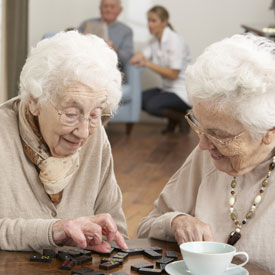 Respite care provides relief for those who are caring for an elderly person who relies on their assistance — whether it is simply helping around the home and offering transportation or more comprehensive care that includes meal preparation, dressing, bathing, grooming as well as housekeeping and shopping.
Respite care provides relief for those who are caring for an elderly person who relies on their assistance — whether it is simply helping around the home and offering transportation or more comprehensive care that includes meal preparation, dressing, bathing, grooming as well as housekeeping and shopping.
Family members who are caregivers often need a break – a few hours a day or for a period while they travel or tend to other family responsibilities. Respite care can include as much or as little care as desired and is customized for the individual’s needs.
An important part of respite care is providing one-on-one attention and care for the elderly person. This may include playing cards or a game, walking together, or simply holding a conversation.
Respite care provides peace of mind for families who appreciate that caregiving professionals are on hand. Some facilities offer respite services only when they are not at full capacity, so a phone call is advised to get the particulars for each community you may have in mind.
An advantage to temporary respite care at an assisted living or nursing home facility, is that it provides a commitment-free way for a senior and caregiver to check out whether the facility might be a good fit down the road when it may be needed for more than just respite care. You and your loved one will have the opportunity to check out the facility and staff in action so both of you will have a more realistic understanding of what community-based living is all about.
There are many benefits for your loved one who participates in respite care:
Socialization & Emotional Well-Being
All the social perks available to full-time assisted living residents are offered to those in respite care. From fun games and activities to group dining, community-based residencies offer many opportunities to meet peers and lift spirits. Socialization is key to maintaining emotional health and respite care helps your loved remain happy and engaged.
Physical & Mental Stimulation
Exercise classes, card games, puzzles, and guest lecturers and entertainers are scheduled to help keep residents physically active and mentally stimulated.
Health & Safety
Short-term respite care includes qualified, professional caregivers who are prepared to
assist your loved one with personal needs from taking daily medications to eating
healthy meals and safely taking showers. Your loved one will be safe and comfortable.
Here is a snapshot of the different levels and types of respite care available so you can
determine which is best for your needs:
Adult Day Services
If a caregiver just wants to get away for a day or has conflicting appointments, adult day
services can provide social activities, meals, transportation, and a safe, supervised
environment in a stand-alone center, nursing homes, or hospital. Check
the directory for a center near you.
Companion Care
A companion can be hired to prepare meals, help with laundry, do light housekeeping,
and shop for groceries and perform other errands. The cost will depend on how much
and what types of services are offered.
Personal Care Assistants
In addition to services to help around the home, a personal care assistant can help with
bathing, dressing, toileting, and grooming. They may provide medical services as well,
such as administering medications and helping with mobility. You can search for inhome
care here.
Assisted Living Respite Care
Continuing care retirement communities, assisted living communities, and nursing
homes, offer room and board for seniors who need help with everyday tasks. Services
may be available for just a day or for several weeks’ duration.
Options for Veterans
The Veterans’ Administration offers several programs and support for veterans and for
wartime veterans who are caring for their spouses. These programs are designed to
give the primary caregiver some help and time off. Many local VAs operate adult
daycare centers which can be an alternative for respite care.
There are also services available for home-based care and homemaker and health care
aides. Go to the VA Caregivers website for more information.
Respite care has many benefits, not the least of which is to relieve any feelings of
guilt on the part of the caregiver for needing and wanting a break from the duties
of caregiving. It is a proven fact that caregivers who take care of themselves too, are
better equipped to return to caregiving with enthusiasm, love, and compassion.
If you have questions about resources available for respite care or care in general for
your loved one, contact Transitions Liquidation Services at 617-513-0433
or email Marie LeBlanc.
